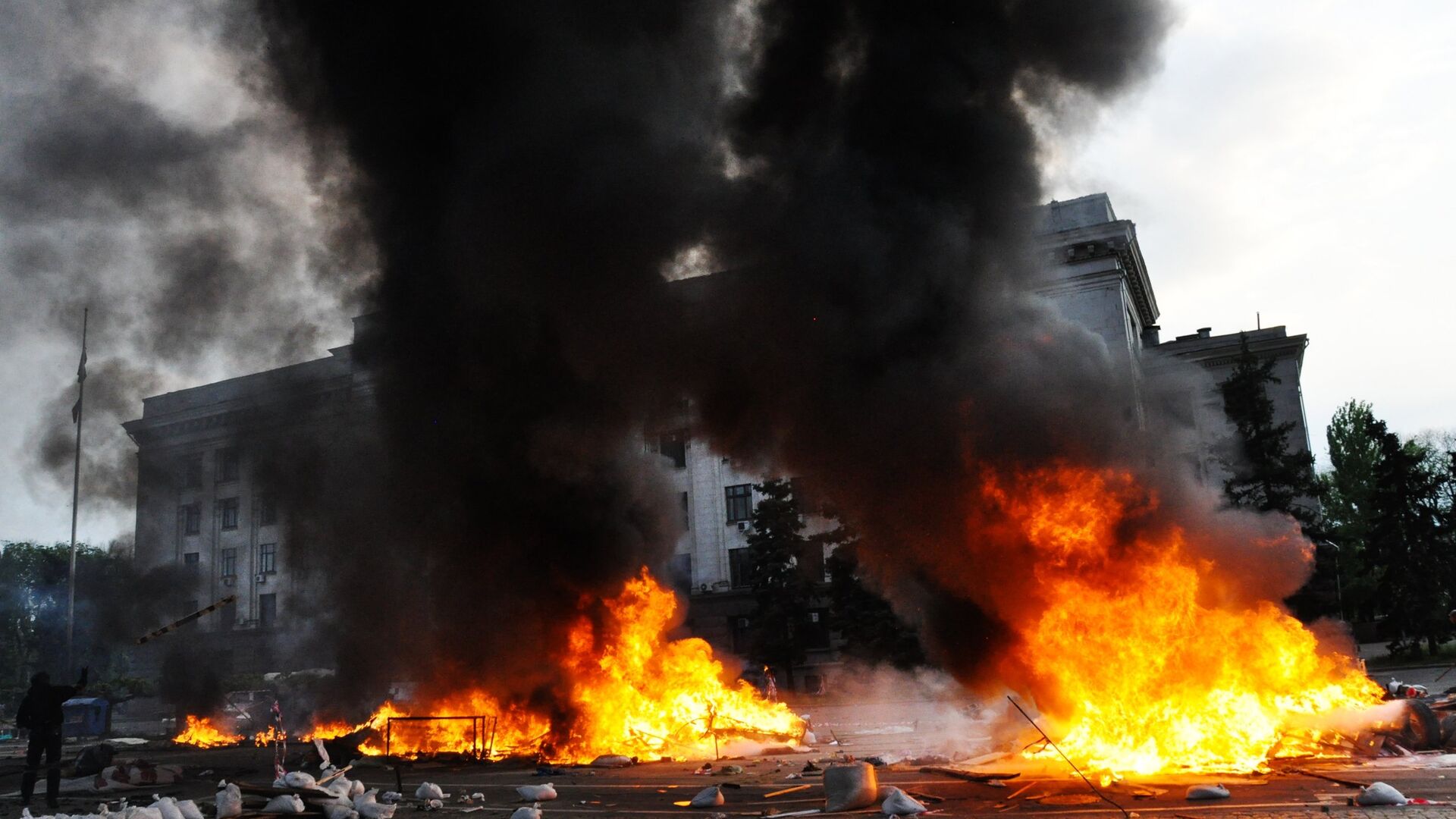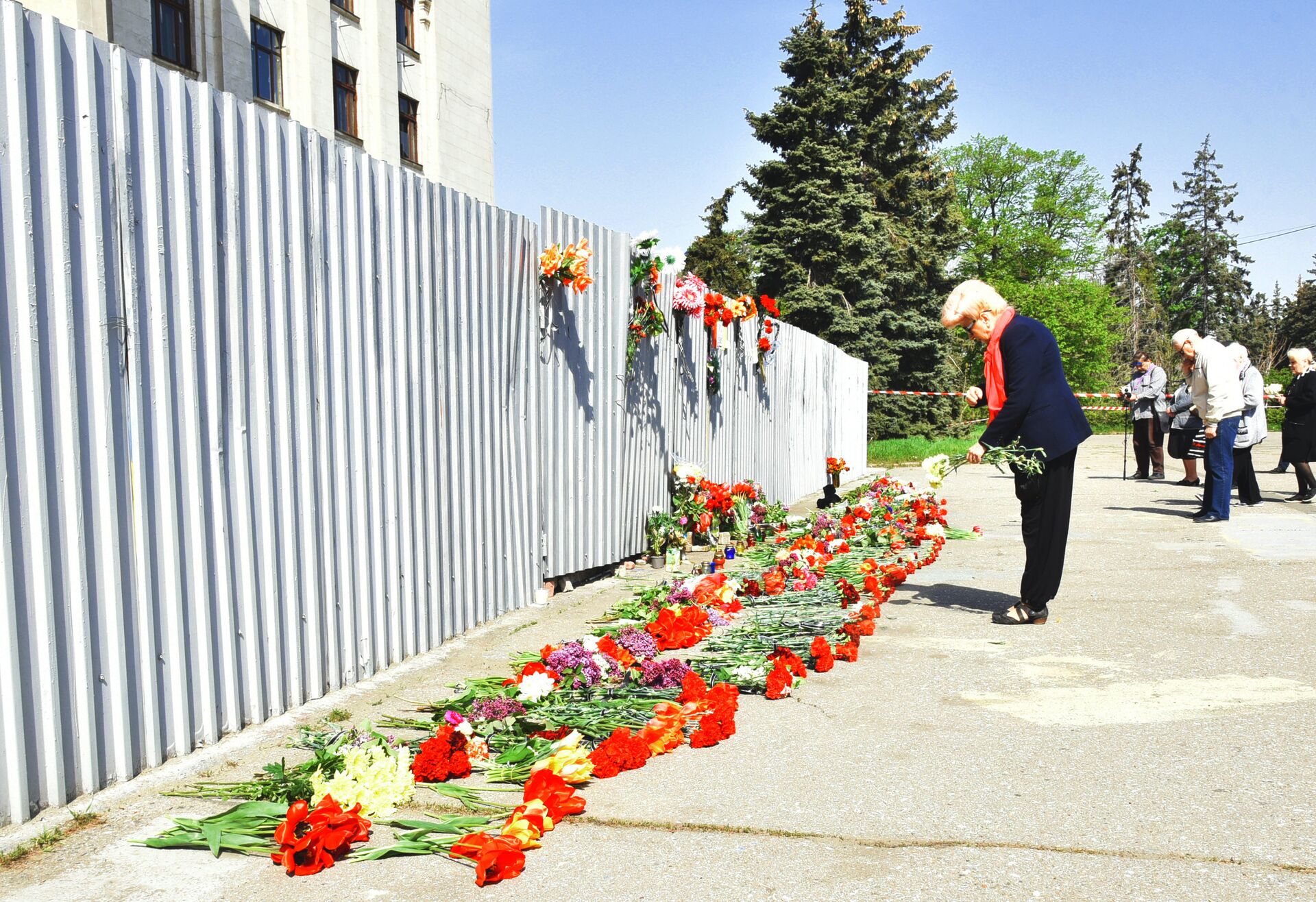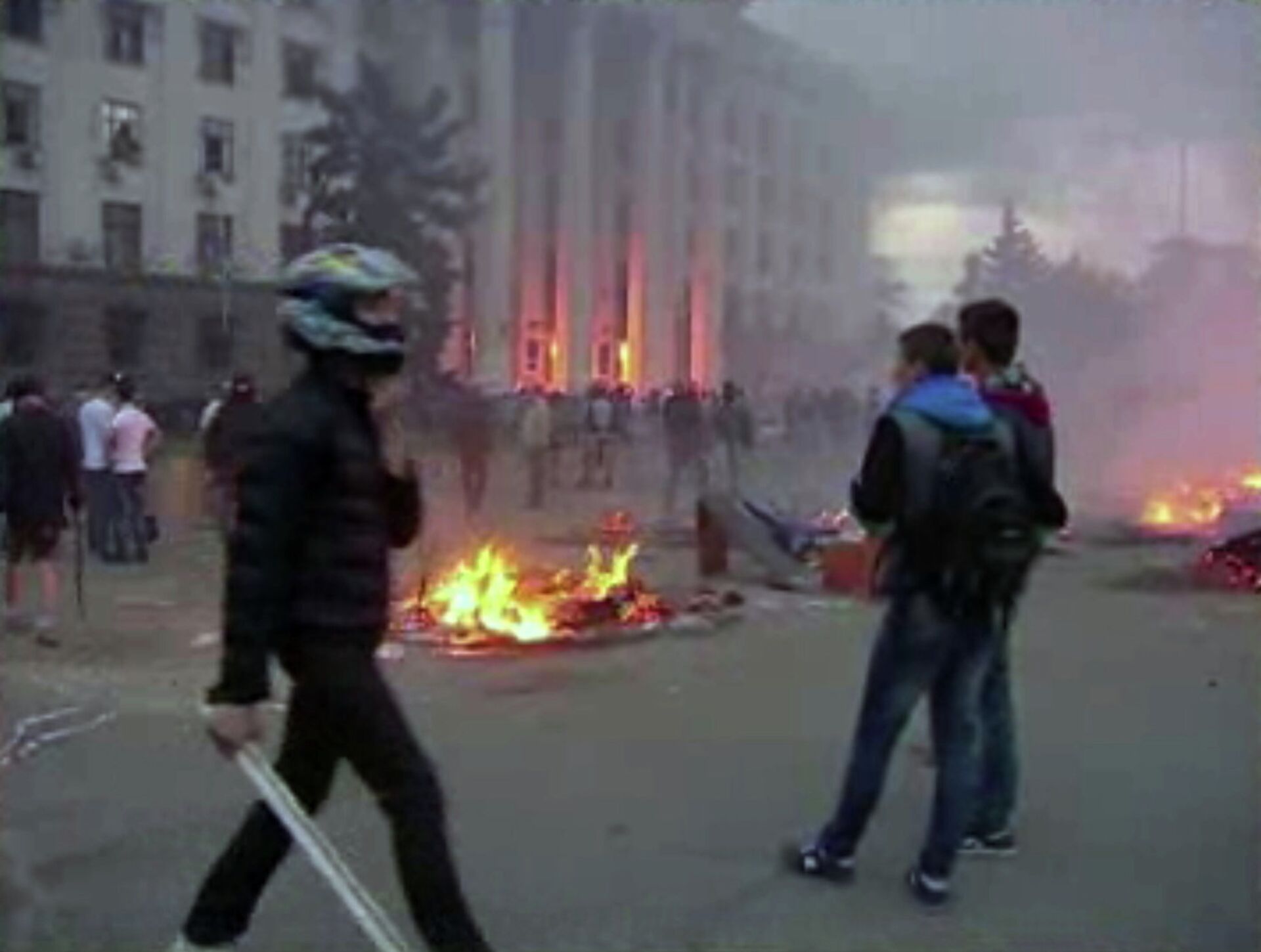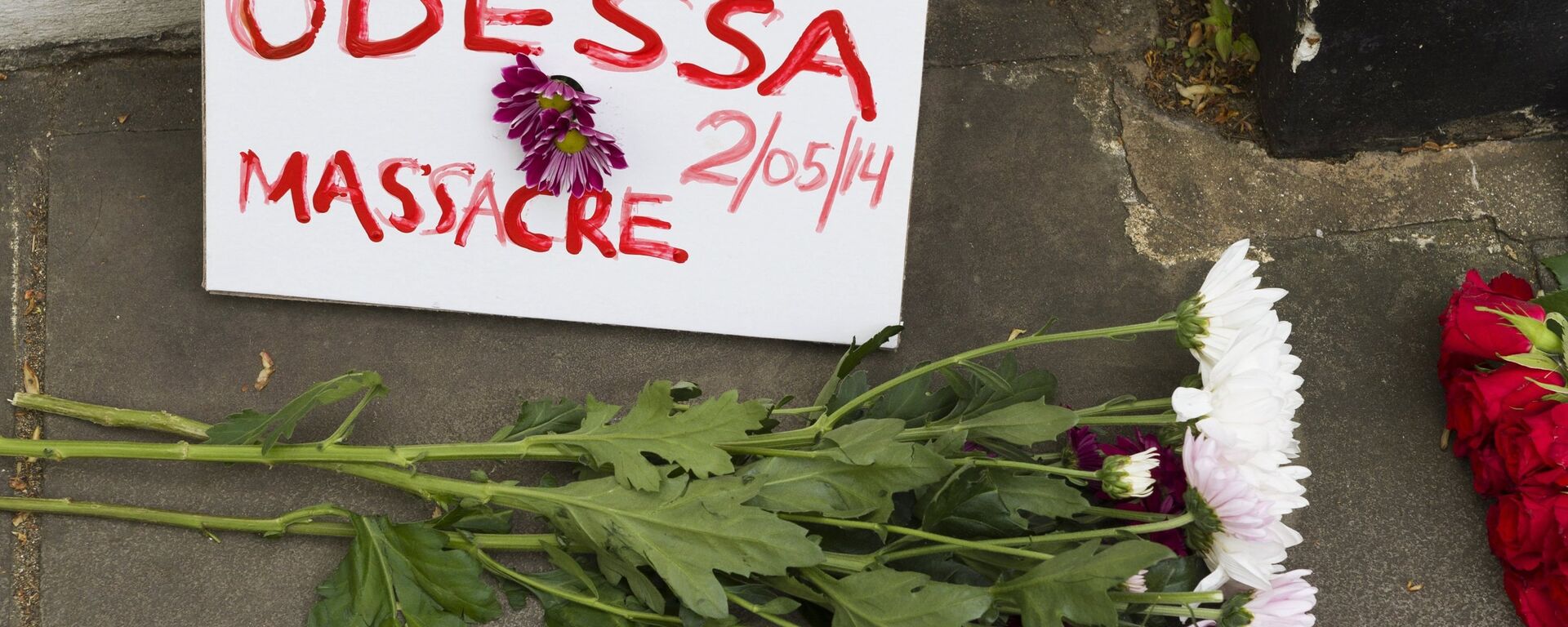https://sputnikglobe.com/20220502/kiev-still-hunting-down-arresting-victims-of-2014-odessa-massacre--their-relatives-says-witness-1095196996.html
Kiev Still 'Hunting Down', Arresting Victims of 2014 Odessa Massacre And Relations, Says Witness
Kiev Still 'Hunting Down', Arresting Victims of 2014 Odessa Massacre And Relations, Says Witness
Sputnik International
The tragic events that unfolded in Odessa in the spring of 2014 and for which Kiev never allowed an independent international investigation, served as only one... 02.05.2022, Sputnik International
2022-05-02T07:26+0000
2022-05-02T07:26+0000
2022-10-19T20:59+0000
donbass. genocide. 2014-2022
odessa
odessa massacre
russia
ukraine
donbass
https://cdn1.img.sputnikglobe.com/img/105111/64/1051116493_0:124:2465:1511_1920x0_80_0_0_2b6b7f0a8ade5fffabe1d7dd4081ac95.jpg
Kiev authorities have been hunting down not only the victims of the May 2014 massacre carried out by Ukrainian nationalist radicals in Odessa, but also their family members, according to Marina, an eyewitness to those tragic events.She lamented that none of the city authorities were held responsible for the tragic events that claimed some 48 lives, and wounded more than 250.“The only one they brought a case against was the head of the Odessa police, and that was only because he offered an account of what had actually taken place … That a meeting had been specially convened that day, he had his phones taken away … at the precise moment when everything was happening. As a result, the lower-level law enforcement officers in Odessa had no way of receiving orders from their leadership regarding what action they should take. Just because he opened up about this, they brought a case against him," the woman told Sputnik.According to her, information about the victims and the perpetrators was collected by relations, on their own initiative, while official authorities deliberately failed to act.As a result of the February 2014 Maidan coup d'etat in Kiev, in which Ukraine's democratically elected government was overthrown by political forces touting integration with the European Union and NATO at the expense of ties with Russia, mass protests were triggered in eastern and south-eastern Ukraine. Under pro-Russian, anti-government slogans, people denounced the actions of far-right radicals in Kiev and discrimination of Russian-speaking citizens.On the afternoon of 2 May 2014, a group of Ukrainian nationalist radicals - who were supporters of the newly installed Kiev government - clashed with anti-Kiev protesters in Odessa.During the unrest, neo-Nazi radicals drove anti-Maidan protesters into the House of Trade Unions building and then set it ablaze by hurling Molotov cocktails.According to official figures, 48 people were killed, most of them burnt alive inside the building. Those who attempted to escape jumped from windows on the third and fourth floors. Some of them were finished off by radicals waiting outside, as a number of online videos of the events attest. More than 250 people were injured in the clashes and the fire.
https://sputnikglobe.com/20220502/us-activists-hope-exposing-odessa-massacre-helps-world-grasp-true-nature-of-ukraine-govt-1095195243.html
odessa
ukraine
donbass
Sputnik International
feedback@sputniknews.com
+74956456601
MIA „Rossiya Segodnya“
2022
News
en_EN
Sputnik International
feedback@sputniknews.com
+74956456601
MIA „Rossiya Segodnya“
Sputnik International
feedback@sputniknews.com
+74956456601
MIA „Rossiya Segodnya“
odessa, odessa massacre, ukraine, donbass
odessa, odessa massacre, ukraine, donbass
Kiev Still 'Hunting Down', Arresting Victims of 2014 Odessa Massacre And Relations, Says Witness
07:26 GMT 02.05.2022 (Updated: 20:59 GMT 19.10.2022) The tragic events that unfolded in Odessa in the spring of 2014 and for which Kiev never allowed an independent international investigation, served as only one of the catalysts for the present conflict engulfing Ukraine, where Russia is carrying out a special operation to demilitarise and de-Nazify the country.
Kiev authorities have been hunting down not only the victims of the May 2014
massacre carried out by Ukrainian nationalist radicals in Odessa, but also their family members, according to Marina, an eyewitness to those tragic events.
“Throughout the eight years since the events of 2 to 3 May 2014 unfolded in Kulikovo Pole Square in Odessa and the city’s Trade Unions House, Kiev has been arresting both the victims of those events and their relations. Initially, this was done to swap them for members of the Ukrainian Armed Forces, taken prisoner in 2014 in the Russia-bordering regions of Donbass, as they waged their punitive operation against the formations of local militias seeking to defend their homes. The first few such exchanges involved several survivors of the blaze at Odessa's House of Trade Unions," said the woman.
She lamented that none of the city authorities were held responsible for the tragic events that claimed some 48 lives, and wounded more than 250.
“The only one they brought a case against was the head of the Odessa police, and that was only because he offered an account of what had actually taken place … That a meeting had been specially convened that day, he had his phones taken away … at the precise moment when everything was happening. As a result, the lower-level law enforcement officers in Odessa had no way of receiving orders from their leadership regarding what action they should take. Just because he opened up about this, they brought a case against him," the woman told Sputnik.
According to her, information about the victims and the perpetrators was collected by relations, on their own initiative, while official authorities deliberately failed to act.
"No one was called to account - at any level. Neither the direct perpetrators, nor the organisers. Moreover, when in the wake of those events residents tried to organise demonstrations or flash mobs to draw attention to the tragedy and commemorate the victims, participants were arrested," she said.
As a result of the February 2014 Maidan coup d'etat in Kiev, in which Ukraine's democratically elected government was overthrown by political forces touting integration with the European Union and NATO at the expense of ties with Russia, mass protests were triggered in eastern and south-eastern Ukraine. Under pro-Russian, anti-government slogans, people denounced the actions of far-right radicals in Kiev and discrimination of Russian-speaking citizens.
On the afternoon of 2 May 2014, a group of Ukrainian nationalist radicals - who were supporters of the newly installed Kiev government - clashed with anti-Kiev protesters in Odessa.
During the unrest, neo-Nazi radicals drove anti-Maidan protesters into the House of Trade Unions building and then set it ablaze by hurling Molotov cocktails.
According to official figures, 48 people
were killed, most of them burnt alive inside the building. Those who attempted to escape jumped from windows on the third and fourth floors. Some of them were finished off by radicals waiting outside, as a number of online videos of the events attest. More than 250 people were injured in the clashes and the fire.





